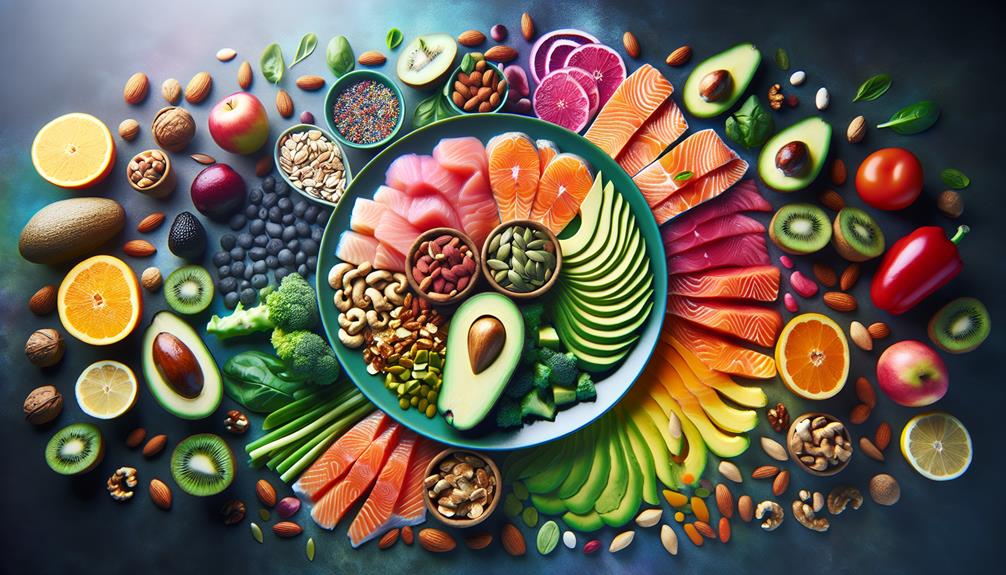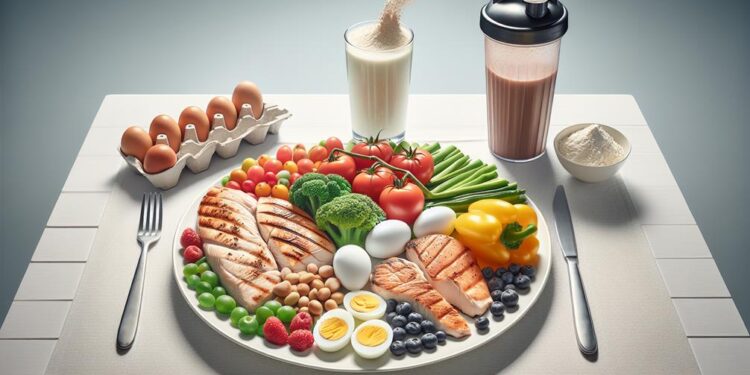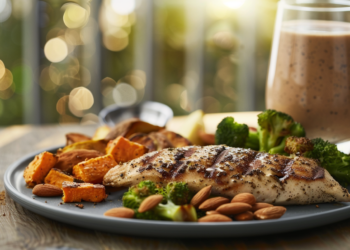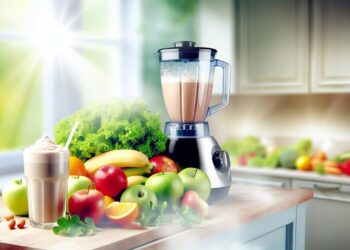To optimize bodybuilding nutrition, focus on balancing macronutrients, especially post-workout protein and carbs. Regular protein intake every few hours aids muscle repair. Proper pre and post-workout meal timing enhances muscle recovery and growth. Hydration is key for performance; monitor urine color for hydration status. Include healthy fats like avocado and nuts for muscle growth, and prioritize micronutrients for energy and immune health. These tips lay the foundation for your bodybuilding journey.
Key Takeaways
- Balance macronutrients for muscle growth and energy.
- Consume lean protein sources regularly for muscle repair.
- Time meals strategically for optimal muscle recovery.
- Stay hydrated to support performance and muscle function.
- Include healthy fats for hormone production and muscle growth.
Importance of Macronutrient Balance
When planning our bodybuilding nutrition, understanding the importance of maintaining a proper balance of macronutrients is crucial for achieving optimal results in muscle growth and performance. Meal timing plays a significant role in maximizing muscle growth and recovery. Consuming the right nutrients at the right times can enhance muscle protein synthesis and overall performance. For instance, having a meal rich in protein and carbohydrates within an hour after a workout can help replenish glycogen stores and kickstart the muscle repair process.
Moreover, balancing macronutrients such as proteins, carbohydrates, and fats throughout the day is essential for sustaining energy levels and supporting muscle growth. Protein is crucial for muscle repair and growth, while carbohydrates provide the necessary fuel for intense workouts. Including healthy fats in our diet helps in hormone production, which is vital for muscle building and overall health. By distributing macronutrients evenly across meals and snacks, we can optimize muscle protein synthesis and fuel our workouts effectively.
Optimal Protein Intake
To optimize muscle growth and recovery, it's essential to maintain an optimal protein intake tailored to individual needs and training goals. Protein is crucial for muscle repair and growth, making it a cornerstone of bodybuilding nutrition. When considering protein sources, lean options such as chicken, fish, eggs, and plant-based sources like tofu and legumes are excellent choices. Incorporating a variety of protein sources ensures a complete amino acid profile, supporting muscle recovery.
Meal timing plays a vital role in maximizing the benefits of protein intake. Consuming protein-rich meals or snacks every 3-4 hours helps maintain a steady supply of amino acids for muscle repair throughout the day. Additionally, having a protein-rich snack before bed can support overnight muscle recovery.
While whole foods should be the primary source of protein, protein shakes can be convenient for post-workout nutrition when whole foods aren't readily available. Protein shakes provide a quick and easily digestible source of protein, aiding in muscle recovery after intense training sessions.
Timing of Pre and Post-Workout Meals

Regularly timing your pre and post-workout meals is crucial for optimizing performance and promoting muscle recovery in bodybuilding. For pre-workout nutrition, focusing on carb loading can provide the energy needed to sustain intense training sessions. Consuming a meal rich in complex carbohydrates about 2-3 hours before your workout can help top off glycogen stores and enhance endurance. Additionally, including a moderate amount of protein in this meal can support muscle preservation during exercise.
After your workout, it's important to refuel your body to kickstart the recovery process. Within 30 minutes to an hour post-exercise, aim to consume a balanced meal containing both carbohydrates and protein. This combination can help replenish glycogen stores and stimulate muscle protein synthesis, aiding in muscle repair and growth. Effective meal timing around your workouts can enhance nutrient delivery to muscles, optimize recovery, and ultimately improve performance in bodybuilding.
Essential Role of Hydration
Ensuring adequate hydration plays a crucial role in optimizing performance and promoting overall health in bodybuilding. Hydration benefits include regulating body temperature, lubricating joints, aiding digestion, and transporting nutrients throughout the body. Proper hydration supports muscle function, endurance, and recovery, all of which are essential for bodybuilders aiming to enhance their physique.
Maintaining electrolyte balance is also vital for bodybuilders as electrolytes like sodium, potassium, and magnesium play a key role in muscle contractions, nerve function, and fluid balance. During intense workouts, electrolytes are lost through sweat, emphasizing the importance of replenishing them through adequate hydration and balanced nutrition.
To stay properly hydrated, bodybuilders should aim to drink water consistently throughout the day, especially before, during, and after workouts. Monitoring urine color can be a helpful indicator of hydration status, with pale yellow urine being a sign of adequate hydration. Including electrolyte-rich foods like fruits, vegetables, and nuts in the diet can further support electrolyte balance and overall hydration levels.
Incorporating Healthy Fats

Hydration is essential for bodybuilders, now let's delve into the importance of incorporating healthy fats into your diet. Healthy fats play a crucial role in supporting muscle growth and overall health for bodybuilders. They provide a concentrated source of energy, aid in the absorption of fat-soluble vitamins, and help maintain hormone levels that are essential for muscle building.
To better understand the significance of healthy fats, let's explore some examples of foods rich in these beneficial fats:
| Healthy Fats | Food Sources |
|---|---|
| Monounsaturated Fats | Avocados, Nuts, Olive Oil |
| Polyunsaturated Fats | Salmon, Flaxseeds, Walnuts |
| Omega-3 Fatty Acids | Chia Seeds, Mackerel, Sardines |
Incorporating these foods into your diet can have a positive impact on muscle growth and recovery. Remember to consume them in moderation as part of a balanced nutrition plan to optimize your bodybuilding efforts.
Importance of Micronutrients
Micronutrients, such as vitamins and minerals, are essential for bodybuilders to support various physiological functions and optimize performance. Adequate intake of these micronutrients is crucial for energy metabolism, muscle contraction, and overall health. While whole foods should be the primary source of micronutrients, vitamin supplementation can be beneficial for individuals with deficiencies or specific needs. When it comes to nutrient timing, consuming micronutrient-rich foods around workouts can aid in recovery and muscle growth.
Mineral requirements are equally important for bodybuilders, as minerals like iron, calcium, and zinc play key roles in muscle function and overall well-being. Iron, for example, is essential for oxygen transport in the blood, crucial during intense training sessions. Meeting mineral needs through a balanced diet is essential to support optimal performance and prevent deficiencies that could hinder progress.
Moreover, micronutrients are vital for maintaining a robust immune system. Nutrient deficiencies can weaken the immune response, making individuals more susceptible to illness and hindering recovery from intense training. Therefore, prioritizing micronutrient-rich foods and considering supplementation when necessary is crucial for bodybuilders looking to maximize their performance and overall health.
Frequently Asked Questions
Can Bodybuilding Nutrition Tips Be Applied to Other Types of Athletic Training as Well?
Yes, bodybuilding nutrition tips can be applied to other types of athletic training as well. Cross training benefits from nutrient timing strategies, enhancing performance and recovery. It's a versatile approach that supports various athletic disciplines effectively.
How Can Bodybuilders Incorporate Vegetarian or Vegan Protein Sources Into Their Diets?
Incorporating vegan protein sources into bodybuilding diets requires strategic meal planning. By carefully selecting plant-based options like tofu, tempeh, and legumes, we can achieve muscle growth and recovery while honoring our dietary preferences.
Are There Specific Supplements That Are Recommended for Bodybuilders to Enhance Their Performance?
We've found that some supplements can be effective for enhancing performance, but it's crucial to weigh their benefits against potential side effects. Timing-wise, pre-workout supplements can boost energy, while post-workout ones aid recovery.
How Does Alcohol Consumption Affect Muscle Recovery and Growth in Bodybuilders?
Alcohol consumption can hinder muscle recovery and growth in bodybuilders. It disrupts protein synthesis, decreases testosterone levels, and dehydrates muscles. To optimize gains, limiting alcohol intake is crucial for enhancing recovery and achieving muscle growth goals.
What Are Some Common Mistakes That Bodybuilders Make When It Comes to Nutrition, and How Can They Be Avoided?
When it comes to nutrition for bodybuilding, common misconceptions can lead to suboptimal results. By making simple dietary adjustments, such as focusing on protein intake, proper hydration, and balanced meals, these mistakes can be avoided.
Conclusion
In the journey of bodybuilding, nutrition is the fuel that drives progress. Just as a well-oiled machine functions optimally, proper nutrition ensures peak performance.
Remember, your body is a temple – feed it with the right balance of macronutrients, protein, hydration, healthy fats, and micronutrients to sculpt the masterpiece within.
Your dedication in the kitchen will be reflected in the results you achieve in the gym. Keep nourishing your body, and watch it transform into a work of art.













